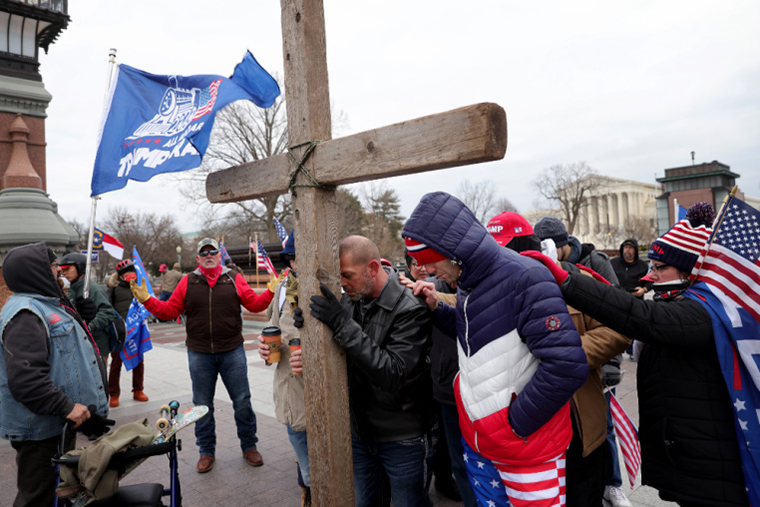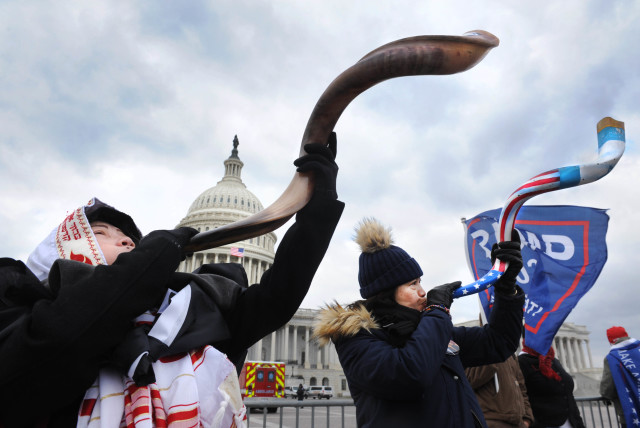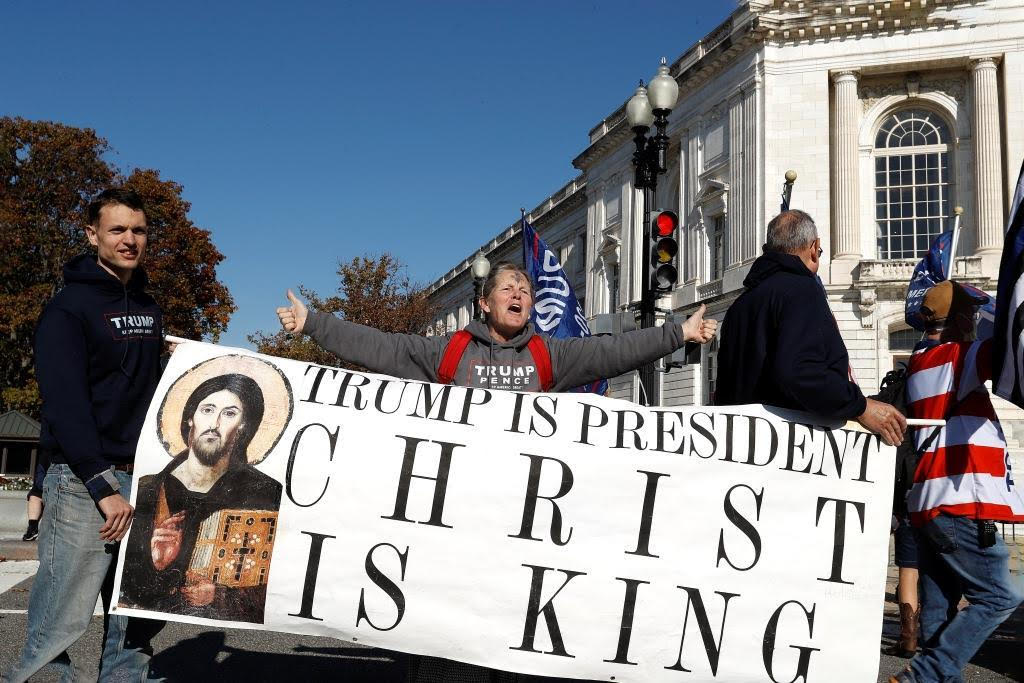Pentecostals’ Political Warfare
A subset of Pentecostals is preparing for a spiritual battle over American elections that could turn into actual violence

(Image source: Win McNamee for Getty)
I took my first stroll around the Capitol Building on January 3, 2021, the day after I moved into the neighborhood. The air was misty and the sky was gray. While there were not many tourists or pedestrians in the area, a small crowd of worshippers caught my attention.
The group was playing contemporary Christian music and dancing. But this was not your average evangelical gathering. Several people wore Jewish prayer shawls, and one blew a shofar, a ram’s horn Jews use in the fall during the High Holy Days. Standing in front of them, in between the Capitol Building and the Supreme Court, I knew this was a particular, yet grossly misunderstood, subset of the evangelical umbrella: the Pentecostal-charismatic movement.
I knew this because I grew up as one.
And because I come from such a community, I knew why they had shofars, music, and dancing. They were engaged in religious rituals to keep Trump in power. What I did not realize was that their spiritual struggle would turn physical only a few days later.
***
In his analysis of the religious overtones of Trump’s hardcore support, never-Trumper conservative and evangelical commentator, David French, wrote:
“It’s no coincidence that Paula White, a pentecostal pastor herself, was Trump’s spiritual adviser. Trumpism penetrated pentecostalism early. I do not mean to say that all pentecostals are Trump supporters, much less Christian nationalists. But you can’t understand the Trumpist Christian core without understanding its pentecostal connection.” [Emphasis mine]
French is correct. Even more, Pentecostal support for Trump has not abated since he left office. To understand Pentecostals’ devotion to this New York real-estate billionaire and media mogul, irreverent playboy, and twice-impeached former president, one must take Pentecostal beliefs seriously. The key idea that undergirds many Pentecostals’ support for Trump, their willingness to storm the Capitol on January 6, and their broader Christian nationalist inclinations, is the Pentecostal-charismatic idea of “spiritual warfare.”
Spiritual warfare fuels their movement, and it could potentially fuel America’s demise.
“Blow the trumpet in Zion”: Spiritual Warfare and Shofars
One of my fondest religious memories growing up—and, in hindsight, a problematic aspect of my earlier faith—was holding a seder meal with my family every year during the Jewish festival of Passover. We were not Jewish. But similar to other Pentecostals (and sometimes even evangelical and Mainline Protestant Christians) we thought we were getting back to the “Jewish roots” of Jesus.
Growing up, my dad kept a shofar, the Jewish musical horn, in our house. While Jews traditionally use the shofar to announce the new year, Pentecostals use it to convey that a battle is taking place. Blowing the shofar, in the Pentecostal-charismatic orbit, is a call-to-arms to prepare for spiritual warfare. That is why some of the January 6 insurrectionists were carrying and blowing shofars as they stormed the Capitol.

(Image source: Loyd Wolf)
To understand what Pentecostals and charismatics mean by “spiritual warfare,” think of the overarching themes in fantasy novels and films like the Lord of the Rings or the Harry Potter series: There is a cosmic battle between the forces of “good” and “evil;” the forces of evil operate openly; a protagonist, destined by some sort of higher power, emerges to combat these dark forces from taking over the world; the narratives conclude in a final, climactic battle, a fight to the death, where good ultimately defeats evil.
For many within Pentecostal-charismatic circles, particularly those who were on Capitol Hill on January 6, this is how they see our world.
“January 6th revealed how very important the sacred myth of the U.S. is for Pentecostal and Charismatic Trump supporters. For them, the spiritual meaning of the nation is way more important than electoral votes or mundane policy shifts,” said Erica Ramirez, a scholar on Pentecostalism and director of applied research at Auburn Seminary.
“Charismatics are skilled at thinking on the scale of metanarrative. The election of Donald Trump became part of their sacred narrative in a manner that other presidents and elections did not.”
The spiritual warfare metanarrative derives from how Pentecostals and charismatics interpret the Christian Bible, a method in which Pentecostals and charismatics see themselves as the continuation of biblical narrative—or what Ramirez describes as the “perpetual now.” It’s foundational to Pentecostalism itself. As the Holy Spirit did at Pentecost when Christ’s disciples spoke in various unknown languages, the Holy Spirit continues to do so today. As miracles occurred throughout the Hebrew and Christian Scriptures, so do they occur today. And as God judged nations in the Bible, so too does God judge nations today.
Drawing directly from Biblical accounts like Joshua—who God commanded to gather the Israelites to march around the Cannanite-occupied city of Jericho, blow their horns and shout to make the city’s walls collapse—the shofar has been a symbol of a Pentecostal spiritual (and political) war since roughly the 1960s.
All of these elements could be seen leading up to January 6th. The day before the insurrection, Trump supporters marched around the Capitol Building for a “Jericho march”—accompanied by contemporary worship music, red MAGA hats, and shofars. Following the Capitol assault, Pennsylvania GOP candidate for governor (and now official GOP nominee), Doug Mastriano–who is not Jewish—announced his candidacy with a man blowing a shofar while wearing a tallit, a traditionally Jewish prayer shawl. Around the same time, shofars were even blown in Canada during the Freedom Convoy in a series of aptly named “Jericho marches” in protests against the mandatory Covid vaccination requirement for Canadian truckers.
All of this reveals how Pentecostals and charismatics, once seen as fringe to American evangelicalism, have traversed beyond their churches and now influence how participants in right-wing movements see themselves. They view themselves as underdog protagonists in a type of sacred fantasy story where evil lurks all around them—in the media, in the business sector, and in the political sphere—and they must wage war in the spiritual and physical realms to overcome this evil.
For many Pentecostals and charismatics, spiritual warfare is but one component within a larger theological worldview, one that finds support in megachurch networks, in social media, and, more recently, within traditional media channels. The name for this theological and political worldview is “dominionism.”
Dominionism and Media Innovators
Dominionism holds that Christians are called by God to dominate every sphere of society to institute God’s complete rule on Earth, and to make humanity ready for the second coming of Christ.
Not all Pentecostals subscribe to this theology. Classical Pentecostalism originated with an emphasis on maintaining a life “set-apart” from the rest of the world vis-á-vis one’s personal conduct (no smoking, drinking, going to dances or movies, etc.), and a general distaste toward participating in the political process, which Pentecostals saw as corrupt and full of sinful politicians.
A later iteration of Pentecostalism, the “neocharismatics,” placed less stress on personal holiness and more on complex cosmologies in the spirit realm—particularly how demons and angels operate in today’s world in ways that dramatically affect individuals, communities, and entire countries.
The idea that demons and angels influence our political life could be seen most recently in a widely-shared video right after the 2020 presidential election. Trump’s spiritual advisor, charismatic pastor Paula White-Cain, called for “angelic reinforcements” from Africa and South America to help Trump win the election, a declaration she made in both English and in tongues.
For those paying attention, this is not a new phenomenon in American politics. At a prayer rally in 2011 for former Texas governor and 2012 GOP presidential candidate, Rick Perry (who himself has a deep connection with neo-charismatics), a self-proclaimed “apostle,” Alice Patterson, declared that “an invisible network of evil comprising an unholy structure” operated within the Democratic Party.
For the Pentecostals and charismatics who support such ideas, political disagreements are not mere debates; they are actual battles against evil. In turn, religious rhetoric about demons influencing American politics has helped fuel an ecosystem ripe for conspiratorial beliefs, particularly for the QAnon conspiracy theory, which holds that the Democratic Party and its leaders harbor a satanic ring of pedophiles. Trump, they believe, was called by the highest echelons of the U.S. military to run for president specifically to destroy this network.
While such beliefs, and support for conspiracy theories, have been most prominent among white Pentecostals and charismatics, there are some caveats. Black Pentecostals and charismatics, while socially conservative, tend to vote for the Democratic Party along with the majority of other Black Protestants. But Trump’s 2020 success with Latinx voters was, in part, due to the influx of Pentecostal and charismatic Latinx immigrants into the United States and the ways their religious outlooks affect their party allegiances.
Despite these distinctions along racial lines, Pentecostal and charismatic ideas about demonic forces influencing the Democratic Party and angelic forces anointing Republican candidates circulate far beyond church pulpits. Pentecostals and charismatics have a keen instinct for media entrepreneurship—utilizing the latest communication mediums to share their beliefs with the widest audiences possible. TikTok has become the most recent venue to promote Pentecostal messages to millions of people, especially to younger Millennials and to Gen Z. Gabe Poirot, a graduate of Kenneth Copeland Bible College, has over one million followers on TikTok, with videos ranging from calls to accept the gospel to clips decrying the evils of abortion.
The Pentecostal inclination to mass-appeal and the utilization of the latest media platforms also point to a lesser-known, yet key characteristic of, the Pentecostal-charismatic movement: its innate populism.
Populism and Pentecostalism
The Pentecostal and charismatic world, from the late 19th century onward, is a movement that’s anti-elitist. From its origins, leaders in the movement railed against the white-collar class, professionalized clergy, popes, and politicians–all in equal measure. It’s perhaps no coincidence that the GOP’s embrace of right-wing populism, and the courting of American evangelicals—particularly Pentecostals and charismatics—occurred simultaneously.
During the 2008 presidential election, the late Senator John McCain, the presumptive GOP presidential nominee, picked a little-known former Governor of Alaska, Sarah Palin, as his running-mate—a choice that stunned pundits and political observers at the time. Palin had a Pentecostal background in the Assemblies of God denomination. Other Pentecostals started to compare Palin to the biblical character “Esther”—a Jew whose marriage and influence on the Persian king, Xerses, saved the exiled Jewish people from a genocidal plot within the kingdom.
With folksy yet pointed rhetoric that electrified the conservative base, along with clashes with mainstream media, Palin can be considered a “pre-Trump” figure. Her populist oratory, along with a background as a “hockey mom” and PTA president with working-class roots endeared her to the GOP conservative base, and especially to her Pentecostal and charismatic admirers, who viewed her as one of their own.
They would eventually view Trump as one of their own. Not because of a similar socio-economic background (he inherited his father’s real-estate empire), faith background (he identified, until a few years ago, as a Presbyterian), or because of a folksy manner of speech (he was born and raised in Manhattan). He was theirs because he made them promises about issues they cared about in language that translates well in the Pentecostal and charismatic orbit: grandiose and apocalyptical bombast coupled in zero-sum, Manichean “us vs. them” terms.

(Image source: John Lamparski for the Associate Press)
And one pertinent issue that he promised he would address was abortion.
Issues like abortion and same-sex marriage, and even fears of creeping “Marxism,” have long been of concern to some factions of American conservatism. But in parts of the Pentecostal and charismatic world, these issues contain cosmic implications for the country’s relationship with God.
In the Hebrew Scriptures, each of Israel’s kings either “did what was right” or “did what was evil” in the eyes of God—with either blessings or curses for the kingdom. Since Pentecostals view themselves as being a continuation of the biblical narrative, they are certain God will judge America by the issues they view as straying from the Bible.
Their motivation is driven by an anxiety that God will bring about far worse crises than either a pandemic or political turmoil could bring. For that reason, in a country where roughly 70% of its population support same-sex marriage, and where about 61% support legal abortion, many Pentecostals and charismatics worry that American democracy and the “liberalization” of society will ruin America’s relationship with God.
According to Professor Ramirez, Pentecostals and charismatics do not consciously oppose democracy. Instead, they believe it’s imperative for this democracy to stay aligned with biblical norms.
“It’s key to understand Pentecostals’ genuine concern for the welfare of America. When Pentecostals feel biblical norms are falling by the cultural wayside, they look for a leader to right the course for the sake of the nation. They often give that leader an Old Testament nickname and narrative.”
The Pentecostal support for Donald Trump soon turned to Pentecostals describing him as a “King Cyrus” figure. Cyrus, a pagan King of Persia who is recorded in the Hebrew Scriptures favorably as “The Great,” allowed the Jews in exile to return to and rebuild Jerusalem. Tara Isabella Burton, a journalist who holds a Ph.D. in Theology from Oxford University, explains the Trump and Cyrus connection:
“While Cyrus is not Jewish and does not worship the God of Israel, he is nevertheless portrayed in Isaiah as an instrument of God — an unwitting conduit through which God effects his divine plan for history. Cyrus is, therefore, the archetype of the unlikely “vessel”: someone God has chosen for an important historical purpose, despite not looking like — or having the religious character of — an obvious man of God.”
In his single term in office, Trump filled fifty-four seats in the federal appellate courts—one less than his predecessor, Barack Obama, filled in twice the time. Most notably, he appointed three Supreme Court justices ages fifty-five and younger who will likely influence the court for the next two decades. Trump’s Supreme Court appointments have undoubtedly set the harbinger for the overturned Roe v. Wade draft opinion that was leaked in early May—something that Trump had always promised he would do.
Trump, for many Pentecostals and charismatics, and countless conservative Christians more broadly, was the vessel to save America and put it on a path of Christian righteousness. His combative and vicious antics made him their darling, irrespective of his personal moral failures or flaws. If anything, these things fueled his popularity and their devotion even more. In their sacred story, an unlikely protagonist with personal demons and a checkered past comes to their rescue. He was not only a fighter; he was their fighter. And most importantly, he was a fighter who delivered.
***
Within the neo-charismatic world, this sacred-fantasy worldview mixes with Pentecostal populist inclinations to produce a hyper-combative and anti-democratic approach to American politics.
A notable example of this combative Christianity can be seen in Senator Ted Cruz’s father, Rev. Rafael Cruz—himself a dominionist preacher in Pentecostal-charismatic circles. At a pastor’s conference in 2016, Rafael Cruz recounted to the attendees the story of Pastor John Peter Muhlenberg, a colonial-era minister who brought three hundred men from his congregation on a Sunday morning to fight for American independence from Britain.
Cruz concluded his story by contrasting between a “non-political” church with a church that is willing to physically fight, with the latter being the exemplar Christian community. “That is our heritage,” Cruz said. His speech was met with applause, hollers, and hands raised toward heaven.
More people need to pay attention to this massive religious-political movement and its place in American politics. This Trumpist, Pentecostal crusade, if not addressed and taken seriously, will use the forces of Earth and heaven to push back against what stands in its way to keep America in God’s good graces. And what stands in its way right now is America’s commitment to democracy.
Miguel Petrosky is an essayist, writer, and journalist based in Washington, D.C. He has written for Sojourners, Religion & Politics, Christianity Today, and now for the Revealer. You can follow him on Twitter @petrosky_miguel.